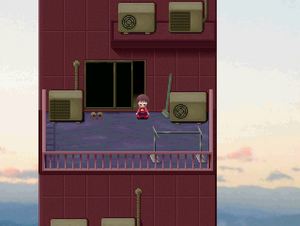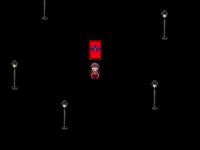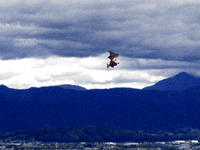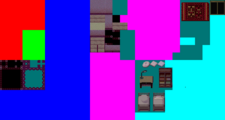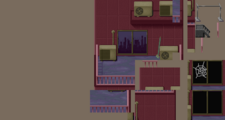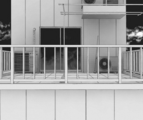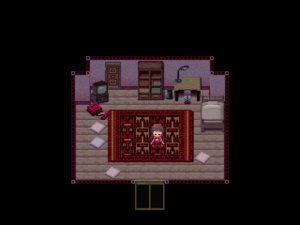| Madotsuki's Room | |||||||||||||||||||
|---|---|---|---|---|---|---|---|---|---|---|---|---|---|---|---|---|---|---|---|
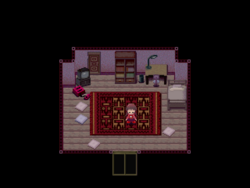 窓付きの部屋 (Madotsuki's Room) | |||||||||||||||||||
| Basic Info | |||||||||||||||||||
| Effects | None | ||||||||||||||||||
| Events | Crick in the Neck NASU The KALIMBA TV Channel The Ending | ||||||||||||||||||
| Notable NPCs | NASU KALIMBA | ||||||||||||||||||
| Other | |||||||||||||||||||
| Connecting Areas | The Nexus The Staircase of Hands (Random) | ||||||||||||||||||
| BGM | ゆめにっき ゆめにっき Yumenikki BGM_034 ゆめはいつもベランダから A Dream Always Begins in the Veranda KALIMBA カリンバ Karimba | ||||||||||||||||||
| Map ID | Missing | ||||||||||||||||||
| Map Type | Small, Normal | ||||||||||||||||||
| |||||||||||||||||||
Madotsuki's Room (現実の部屋, Genjitsu no heya, Real Room, ベランダ, Beranda, Veranda) is where the player starts (and ends) the game. This room and its balcony are the only locations Madotsuki can access outside her dreams.
Although Madotsuki can go out onto the balcony, attempting to leave the room by the door results in her simply shaking her head. This may be either due to her being a hikikomori, or because Madotsuki is physically unable to open it.
The balcony background changes depending on the time of day. It is a place of limited functionality until a later point in the game, and its dream world representation simply serves as a spawn point for the dream world.
In the manga, her room is the same and has the same role as the game. However, the manga dwells on a theory that she cannot leave the room because someone locked her in.
Points of Interest
Her desk is where she writes in the titular dream diary to save the game. She also has a television that receives no channels but can be used to play NASU by interacting with the Famicom console.
The bed is the most important object in the room. When Madotsuki climbs into bed, there is a three second countdown in the top left corner of the screen. When it hits zero, the screen blurs out and Madotsuki starts to dream.
Dream Representation
When Madotsuki falls asleep, she finds herself on the dream representation of her balcony (夢ベランダ, Dream Veranda). The bedroom (夢の部屋, Dream Room) is identical to the real one except for a couple of subtle differences - the Famicom is gone and the balcony backgrounds become slightly more surreal.
Points of Interest
When switched on, the TV no longer displays the test card. Instead, either a large eye peering into the room or the KALIMBA TV Channel event will be shown, the latter being a 1/8 chance.
Instead of writing in her diary, sitting at the desk and pressing the "Z" button (interact) will let Madotsuki scoot the chair around her bedroom. She can ride the chair almost anywhere within the dream world (albeit very slowly), but will not be able to get off it until she returns it to her desk. Sitting on the chair and equipping an effect can result in a glitch that increases Madotsuki's speed.
Entering the dream bed does not cause her to fall asleep. Like all other beds, there is a 1/5 chance that it will transport her to the Staircase of Hands. The chance of this is determined when Madotsuki falls asleep, as one bed in the dream world is randomly selected to teleport her.
Most importantly, Madotsuki can leave the dream bedroom via the door. This leads her to the Nexus and every subsequent location within the dream world.
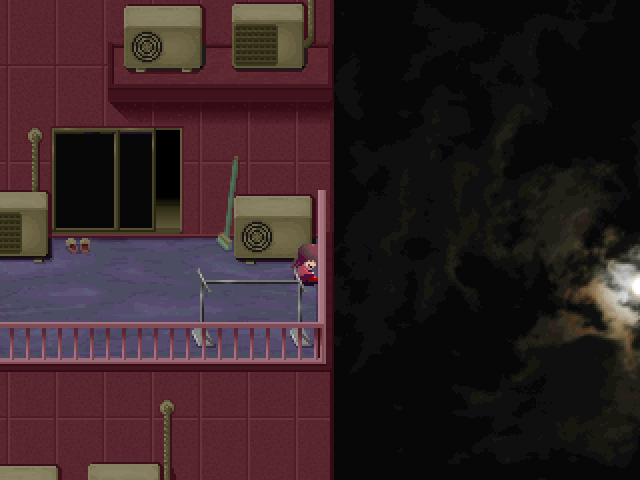
Connections
- Madotsuki's Room
- Madotsuki's Dream Room - Sleep in the bed
- The Nexus - Exit via the door
- The Staircase of Hands (Random) - Sleep in the bed
- Madotsuki's Dream Room - Sleep in the bed
Trivia
- There is a 1 in 64 chance that upon waking up, Madotsuki will have a crick in her neck that will cause her head to be always facing towards the left. While in this state, she cannot play NASU or save the game and can only go back to sleep.
- In version 0.04, there is an unused panoramic background depicting several images of Madotsuki's room in a Fibonacci spiral formation. Though the use for this background is unknown, it could have been intended for Madotsuki's dream bedroom or the dream balcony.
- In versions before 0.07, the TV in the dream world had a different design on it. In 0.07, there is a 1 in 8 chance that the dream TV will be on by default.
- The door that leads to the FACE event in the stairway of Number World is the same one that Madotsuki refuses to open in the real world. This could suggest that FACE represents her fear of whatever is beyond her room. In the files of version 0.08, graphics for a Paracas gate known as FACEtile could have been used instead.
Interpretation
Due to Madotsuki's room being the only thing to visually stimulate Madotsuki in the real world, it's likely that elements of her room have affected her dreams. Some elements of her room appear straightforwardly in her dreams, such as the identical Beds in places such as Block World and Snow World, the many lamps in places such as Puddle World and Lamp World (as she has a small lamp on her desk that lights up when writing in her diary), and even her door appearing in the Number World Stairway as well as doors being the main theme of the Nexus. Her Famicom, which can play the NASU game, has also affected her dreams in the form of the various Famicom worlds (more about how the NASU game may affect Madotsuki's dreams can also be found on the NASU page). The large carpet in her room has a very similar appearance to Paracas textile work, which may have inspired the many instances of Indigenous Imagery in her dreams.
Madotsuki's balcony is also a point of interest. Notably, a pair of shoes can be seen there. In Japan, it is customary to take off your shoes while going inside a house, though this is also done when entering the afterlife or before ending one own's life. Various dreams and events, such as the Falling Man event and Witch's Flight event (it should also be noted a broom is on the balcony, connecting it to the Witch's Flight event), could mean Madotsuki contemplated jumping from her balcony even before the events of the game.
Madotsuki's room in the real world has drawn similarities to a story involving the Japanese comedian Tomoaki Hamatsu (also known by his stage name "Nasubi") and could have possibly been the inspiration for Madotsuki's real-world situation. In 1998, Nasubi had won a lottery for a show business-related job, which turned out to be a reality TV stunt in which he was locked in an apartment with no food or clothing, livestreamed, and forced to win his way out by earning one million yen worth of prizes via magazine sweepstakes. Some elements of Nasubi's experience, whether they were there from the beginning or were won through the sweepstakes, could be represented in Madotsuki's room:
- At the beginning of the challenge, he had a rack of magazines so he could enter sweepstakes. Madotsuki has a bookshelf in her room filled with books.
- Other parts of the room before Nasubi had won anything include a cushion and table, which could be represented by the table that Madotsuki sits at and the various pillows scattered throughout her room.
- He won a television, though it had no antennae or cable, so he could not watch it, similarly to how the TV in Madotsuki's room has no channels. He eventually won a VCR and two video tapes to watch, which could be why two channels appear on Madotsuki's TV in the dream world (the eye channel and the KALIMBA channel).
- He won a Playstation which he could play games on, which could be represented by the Famicom in Madotsuki's room whose only playable game is NASU. The eggplant theme associated with NASU may also reference the "Nasubi" stage name.
- He also wrote in a diary, which became a best-selling book in Japan. The diary concept is central to Yume Nikki and is used to save the game.
It's possible that the events of Yume Nikki are a fictional recreation of an event similar to Nasubi's own experience, which would explain why Madotsuki is unable to leave her room and is shown to live in the unrealistic condition of being in an apartment with no food or bathroom. This could be why she jumps from the balcony at the end of the game, as it is the only possible escape, and living in such conditions could have negative psychological effects on a person. It's also likely that KIKIYAMA was simply aware of the Nasubi story and used it as inspiration for the real world's setting.
Gallery
Madotsuki's room and balcony as they appear in the manga.

